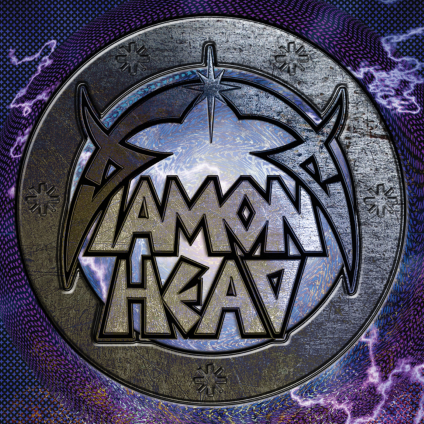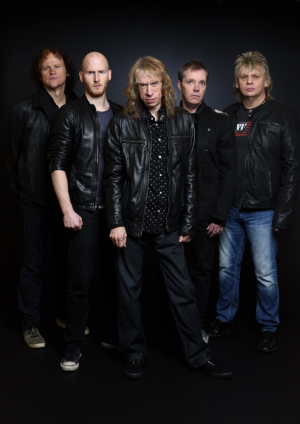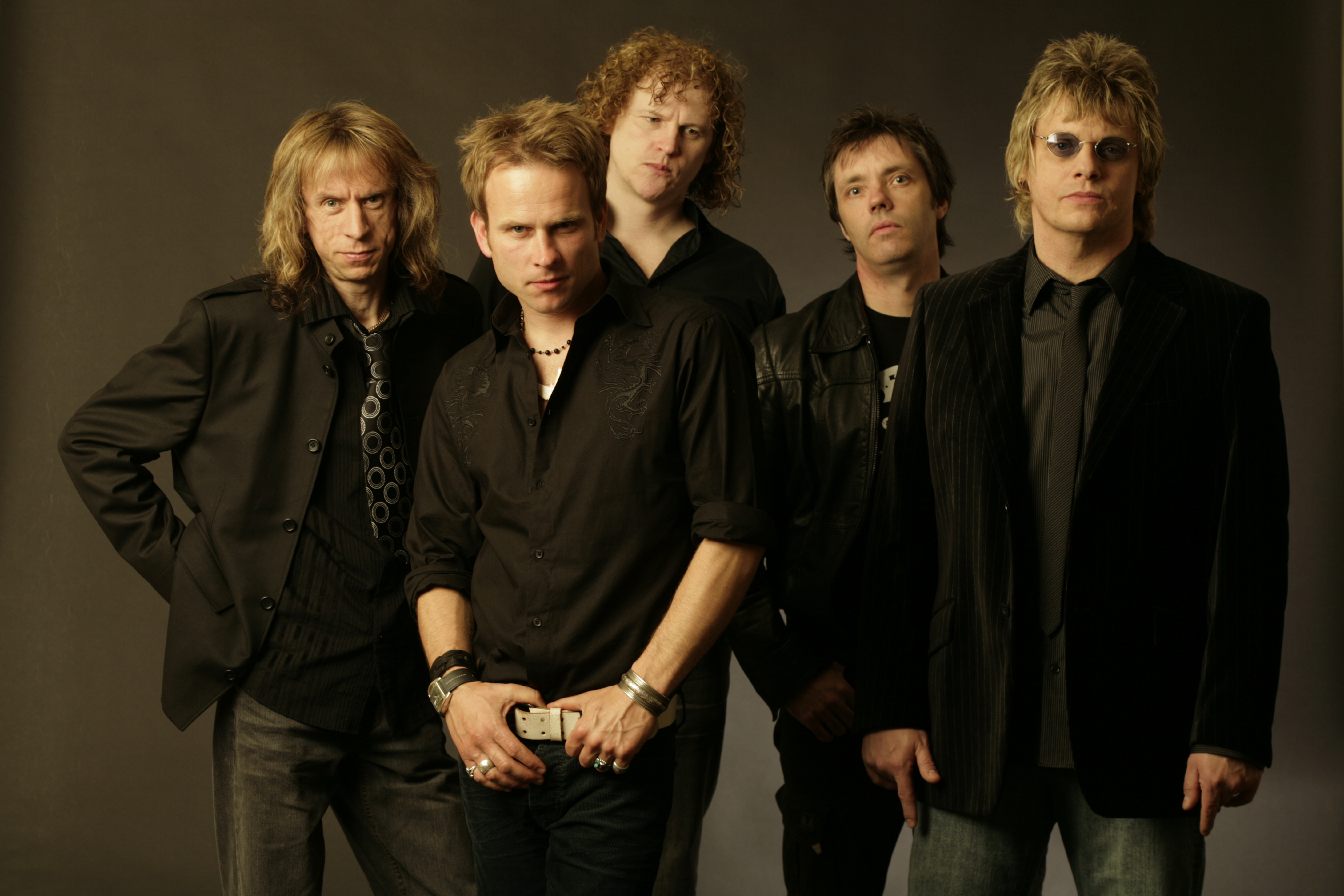INTERVIEW: Brian Tatler – Diamond Head
Stourbridge band DIAMOND HEAD have long been considered one of the pioneering acts to emerge from the New Wave Of British Heavy Metal in the late 1970s and early 80s, with acts like METALLICA hailing them as inspirations to this day. Ahead of the release of the band’s seventh, self-titled album, Jack Fermor-Worrell caught up with guitarist Brian Tatler to discuss the band’s newest frontman Rasmus Bom Andersen, their attitudes towards songwriting, and how it felt to be a part of one of heavy music’s most important movements.
So, you’ve got the new album due out in about a month’s time now?
Brian: Probably a bit less than that now actually, I think April 22nd is the release date.
Am I right in thinking that it was delayed from what you’d initially planned?
Brian: Yeah – I mean initially we thought we’d do it ourselves, everything’s normally paid for by the band, we do a DIAMOND HEAD pot and we pay for the rehearsal, recording, mixing & mastering, artwork, manufacturing, everything really. We just thought we could make more money if we did everything ourselves: mail-order, selling it at gigs, putting it through a digital outlet and all that. So, that was the plan and we set a release date of March 11th, but then we got involved with this company called Dissonance Productions and they loved the album and said they’d like to do a licensing deal. So we signed the album over to them, and then of course they have to do their versions – they’ve done it on vinyl and bonus discs and all kinds of things. And so they wanted to put the album release date back to April 22nd.
What can fans of the band expect from the record?
Brian: Well I think, and this probably sounds clichéd, but I do think it’s a return to form. What I mean is, I think we seem to have found some new fire by bringing in our new singer Rasmus and doing it the way the band used to make albums, which is y’know all together in the same room and trying to write the songs together, rather than doing them on little demos or sending them back and forth by email. We thought “Let’s try and make it how we used to”. And Rasmus has just given us such a boost – his vocals are just so amazing, I think he’s a fantastic singer. And I almost didn’t fully appreciate what he was capable of until I heard all of the guide vocals while we were making the record. Because by then, he’d had time to work on the lyrics and the tunes and all that. So I suddenly thought “Wow this is going to be great”, and it’s been a real eye-opener to hear what Ras is capable of in terms of his range and his power.
Would you say there’s quite a lot of difference in working with him compared to working with [ex-vocalists] Nick or Sean, for example?
Brian: Erm, yeah, I think all three have been different. We’ve had three singers since we started and all three have been very different in their approach to writing really. It’s just, I guess because he came in new in 2014, I think he’s probably got a lot of fresh ideas and he’s been able to throw things into the pot that we might not have considered in the past. So, they’re all good in their own ways y’know, and Ras has just proved to be really very strong in coming up with vocal melodies and seeing a bit of a vision for the whole thing. Lyrically and thematically, he’s tried to kind of take it as a whole and make the album sound as one really
What led you towards the decision to make the new record self-titled?
Brian: Okay, it’s quite a simple answer. We tried to think of a title and we had a list on the wall saying “Name This Album”. People would write down any suggestions they’d come up with, very often a stupid suggestion, and I think our bass player Eddie suggested Diamond Head. And so, I thought about it, and I thought actually that’d be good to call it Diamond Head. So I said to everyone else “We’ll call it Diamond Head unless someone can think of a better title”. And nobody did! You know, very often you name the album after one of the song titles, but I didn’t think anything was quite suitable, and a couple of the titles kept changing anyway as Ras was working on lyrics. So in the end I thought an eponymous title would be a good idea – it’s been done before, but it feels like a statement. Kind of a relaunch, but I just thought let’s go for it.

And obviously this is the first Diamond Head album since What’s In Your Head? came out 9 years ago – did you and the rest of the band feel any kind of extra pressure to deliver, given the time it’s taken?
Brian: A little bit – you write with the thought that people are going to expect something good, otherwise they’d be thinking “Well what have they been doing for all this time?”. But in one way, I had chance to build up a backlog of material because I’m always writing at home and saving stuff for albums. So you keep storing things away, and I’d been spending time with a good friend of mine who’s actually SLIPKNOT’s live sound engineer and co-produced our last record – he only lives about eight miles away. And he’s got a Pro Tools rig in his house, so I’d go round and we’d work on songs together. And since about 2007, I’d been building up a backlog. I think that probably helps with the quality control because it means I can afford to be a bit more picky. As I say, I gave Rasmus probably around 45 pieces of music to have a listen to, and we whittled it down to 14 in rehearsal, then 11 for the album. So we had a lot to choose from and the quality comes through a bit better I think if you’ve got plenty of choice.
Where would you say the new material sits in relation to your back catalogue in terms of sound then?
Brian: I don’t know actually. A couple of people have said that it sounds like the album we should have made after Borrowed Time. Which is weird I think, because you can’t go back thirty years – your brain can’t possibly be in that place. But maybe it’s because it was written, like I said, in a room with this fresh singer coming in bringing ideas. The brief as well – to try and make it sound like a DIAMOND HEAD album. I don’t want to be chasing; I don’t want to even try and compete with a lot of the modern metal bands. So I think I just wanted to do what we do, we’re probably taking some influence – certainly a sound being amplifiers but recording techniques have moved on a lot in thirty years and so some of that’s probably on board but it certainly feels like classic DIAMOND HEAD.
What was the most challenging aspect in recording this new album for you personally?
Brian: Probably just being able to play things in time and properly, and being able to make up solos. I would work out a lot of the solos at home and I’d sometimes record one, say fifty times, until I couldn’t come up with anything else. But yes, some of the riffs are quite tricky – the first riff in Shout At The Devil is quite tricky, and the main riff in Wizard Sleeve is too. So you just try to get them down – you have to use technique to warm up and get your fingers going and get the riffs down to tape with the right kind of feel so it doesn’t sound stale or messy, but sounds like you’ve been playing it for months really.

Were there any moments in the studio where you’d come up with things just completely improvised?
Brian: Yeah, you do. Sometimes in the solo you’d just play one note different and think “Oh that sounds good”. Or Adam, the engineer would spot something and you’d listen back and think what you’d done differently. That’s nice when you can catch something like that – something off-the-cuff and special. And also, I came up with a couple of edits – like there’d be a bit where I’d double a certain section. And normally, years ago, you couldn’t have done that once you’d recorded all the drums and guitars and everything. You couldn’t suddenly say “I want that twice as long”. But by listening to the stuff over and over again I would often think if I wanted a certain bit longer or shorter – and you can do an edit in Pro Tools fairly quickly in a matter of minutes, and not be able to tell it’s been edited. So I had a few good ideas during the recording process where I’d say “I want to try this…”, and they always worked – my instincts were good.
Do you think having the likes of Pro Tools around has changed the way you go about things at all then?
Brian: A little bit – it’s cheaper now. Years ago I’d go into a studio – a 24-track studio, that was the pinnacle. And it would be really expensive, even the tape. Each reel of tape would be about £70-£75 so if we got through maybe ten or twenty tapes, you’re talking maybe £1500 just in tape cost. Nowadays you don’t have any of that and you haven’t got to piss about with having to line up the tape machine and clean the heads and rewinding the tape, all that kind of stuff. None of that exists now, it’s all very high quality instantly. So you can make an album much more cheaply now – this new one was much cheaper than, for example, Borrowed Time was, or Canterbury, or Death and Progress because you can just do it almost at home – it’s better to have a studio because you can get the whole band in and all that, but it’s almost make your own album.
Is there a certain track on the record that stands out to you as being particularly strong?
Brian: I’m biased towards Bones, the opening track, as well as All The Reasons You Live – those are my two favourites at the moment. It’s really interesting that as we’ve sent out press copies and we’re getting reviews back, people seem to be picking different tracks and not just all focusing on one. They’ve named every single song and that’s very surprising to me, and encouraging that people can tell that there’s a quality in the writing and there’s no fillers, like we’ve thrown a few duff songs on because they’re all we’ve got. As I said, maybe because we had so many to pick from, that’s why the quality’s so high.
You’ve been at the forefront of Diamond Head for 40 years now – how difficult is it to sustain a band for that length of time?
Brian: Haha, I hate to admit that – makes me sound really old! It’s difficult – we have split twice, so it is difficult. And it’s a miracle that we’re still going. I have to give some of the credit to METALLICA, because I think without them covering DIAMOND HEAD material – for a start, the money has been quite helpful, but also they’ve kept us in the press and gave us a lot of credibility by saying how influential DIAMOND HEAD was to them. So a lot of the work we’ve done and the work we get has probably been because our name’s been kept alive and it’s out there – people have heard it. People come and they get into DIAMOND HEAD through METALLICA. And also, we’re prepared to do the work – we’ve sat in those vans and done ten hours on the motorways and played little clubs. If it’s possible, we’ll make it happen.
Diamond Head really got started around the whole NWOBHM scene – what was it like being in a band as that was going on?
Brian: Well, we started in ’76 and that whole scene really started around 1979, so we’d had three years to get good if you like, or build towards that. And then once it all happened and Sounds featured it and gave it a name, we just thought it was perfect timing for us because we could get exposure and get in the magazine, and get noticed by record companies. It hadn’t passed our attention that IRON MAIDEN were getting signed by EMI and DEF LEPPARD got signed by Phonogram and got the front page of Sounds and all that, so we just thought we were perfect for that and should be able to get a deal out of it.
How do you think the rock scene has changed since those days then, for you?
Brian: Well there seemed to be a period in the 80’s when British rock seemed to essentially die, there didn’t seem to be any interest in it. There were probably a few that survived – like IRON MAIDEN, like DEF LEPPARD. America seemed to take over from what I remember, you couldn’t move for hair bands or metal bands. So loads of the NWOBHM bands seemed to just disappear, almost like a cull really. And then you had grunge and all that, and it didn’t seem like there were really many great British bands, rock or metal, that have appeared over the last twenty or thirty years that’ve stood the test of time or really done something original. America seemed to have something, like an upper-hand somehow. So when a British band does do well I’m always really happy to see it and support it, if you like, because I think Britain’s produced some of the greatest bands of all time and I want to continue that tradition really and see new bands crack the world, crack America.
Is there any one act you can think of that particularly stands out to you right now?
Brian: Well, I like MUSE and BIFFY CLYRO – there’s a few I like really that aren’t really emerging anymore are they? I like GHOST, I’m a fan of PORCUPINE TREE but again they’ve been around a long time. RIVAL SONS – I think their singer is fantastic, but I haven’t heard the right song yet, they need to give him the right song and then they’ll conquer the world.
You were out on the 70,000 Tons Of Metal cruise last month – how did those shows go?
Brian: Oh that was brilliant – I’d love to do that again.
You’ve got a whole bunch of European and UK festivals lined up over the next few months, including Bloodstock in Derbyshire – is that something you’re looking forward to?
Brian: That’s right – Bloodstock, that’ll be great. We’ve done Bloodstock once before and always wanted to do it again. It’s gotten bigger and bigger over the years too so it’s going to be great. We’ve got Sweden Rock too, and another festival there I’m not too familiar with. There’s a couple in Germany, a couple in Spain, we’re doing Hard Rock Hell in Ibiza, and hopefully we’ll get over to the States later in the year – that’s something we’re talking about now. We’ve done three tours of the US in the past five years so we’re probably going to go back either this year or the beginning of next year.
So, are the festival performances still something you greatly enjoy doing?
Brian: Yes, we like playing festivals. You get a big crowd and everybody’s there to have a good time. You do an hour and it’s great stuff. The more the merrier!
Finally, is there anything you’d like to say to the readers of Distorted Sound that might be fans of DIAMOND HEAD?
Brian: Well, hopefully check out the new album really because it seems to be getting quite popular – I’m very surprised at how many journalists have said they like it. Because you never know when you make a record if people are going to like it or not, you just do your best. And we’re getting such a resounding thumbs-up for this album, the best we’ve had for a long, long time. Some of the best comments and quotes I’ve read for many years, and I think part of it is Ras – he’s done a brilliant job. But maybe just the songs as well, we’ve cracked something. So I hope people like the new album, I hope they can get hold of copies and maybe come and see us on tour!
Diamond Head will be released April 22nd via Plastic Head/Dissonance Productions. For more information, visit the band’s website.

